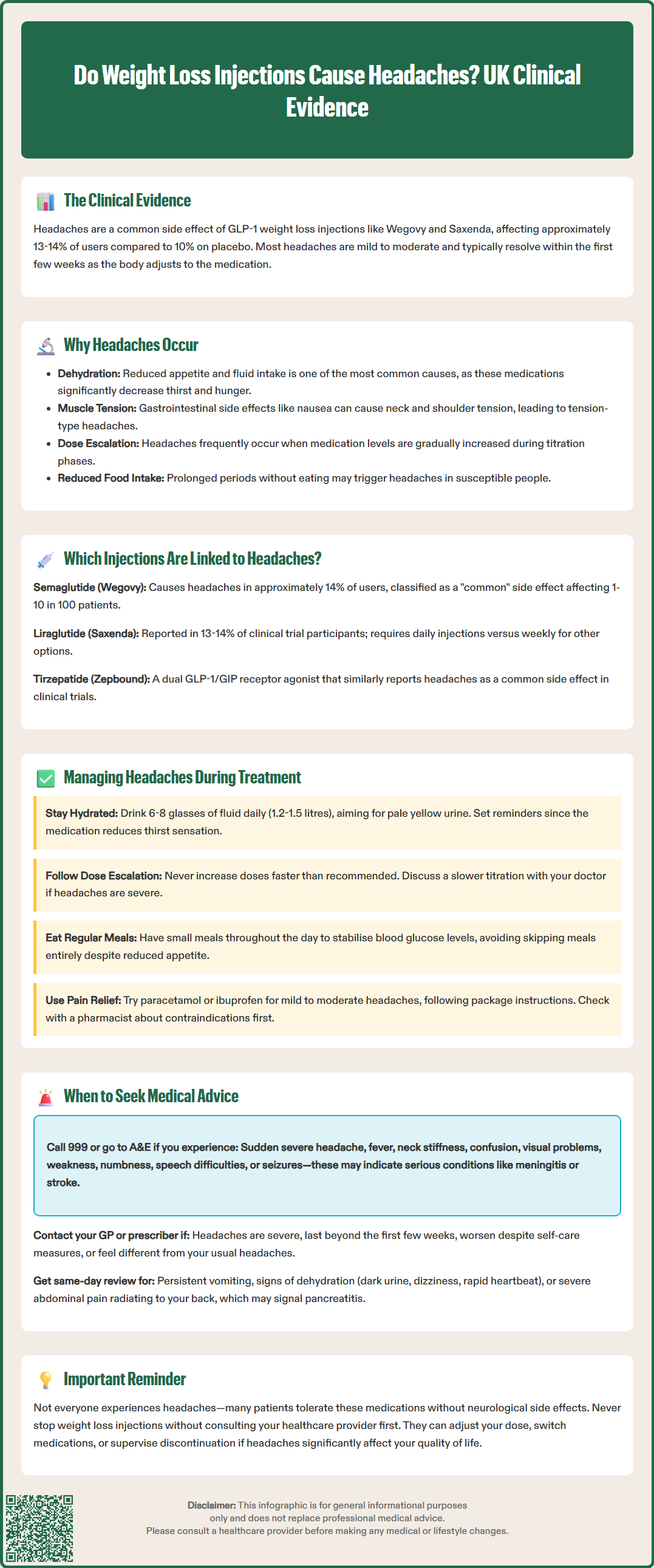
Weight loss injections, particularly glucagon-like peptide-1 (GLP-1) receptor agonists such as semaglutide (Wegovy) and liraglutide (Saxenda), have become increasingly prescribed for obesity management in the UK. Whilst these medications demonstrate significant efficacy in supporting weight reduction, they are associated with various side effects. Headaches represent a recognised and common adverse effect, affecting approximately 13–14% of patients in clinical trials. Understanding whether weight loss injections cause headaches, why they occur, and how to manage them effectively enables patients and healthcare professionals to optimise treatment outcomes whilst minimising discomfort. This article examines the evidence, mechanisms, and practical management strategies for headaches associated with weight loss injections.
Quick Answer: Yes, weight loss injections, particularly GLP-1 receptor agonists, commonly cause headaches in approximately 13–14% of patients, though most cases are mild to moderate and resolve within the first few weeks of treatment.

Mounjaro® is the most innovative GLP-1 medication proven to dramatically curb appetite, hunger, and cravings to help professional men achieve substantial weight loss.
Start Here
Wegovy® is a weekly injectable GLP-1 medication with proven effectiveness in reducing appetite, hunger, and cravings to help busy professionals lose significant weight.
Start HereYes, headaches are a recognised side effect of weight loss injections, particularly those in the glucagon-like peptide-1 (GLP-1) receptor agonist class. Clinical trials and post-marketing surveillance consistently report headaches as a common adverse effect, though gastrointestinal symptoms typically occur more frequently.
In the pivotal STEP clinical trials for semaglutide (Wegovy), headaches were reported in approximately 14% of participants receiving the medication compared to 10% in the placebo group. For liraglutide (Saxenda), the SCALE trials reported headache incidence of approximately 13-14%. According to the MHRA-approved Summaries of Product Characteristics (SmPCs), headaches are classified as a 'common' side effect for both medications, meaning they affect between 1 and 10 users in 100.
Most cases are classified as mild to moderate in intensity and typically resolve within the first few weeks of therapy as the body adapts to the medication. Headaches often emerge during dose escalation phases, suggesting a relationship with medication titration. It is important to note that headaches also occurred in placebo groups, though at lower rates, suggesting that whilst the injections contribute to headache occurrence, they are not the sole cause in all cases.
This does not mean everyone will experience headaches, and many patients tolerate these medications without significant neurological side effects. Understanding the relationship between weight loss injections and headaches helps patients make informed decisions and prepares them to manage potential side effects effectively. Healthcare professionals should discuss this possibility during prescribing consultations, ensuring patients know what to expect and when intervention might be necessary.

The mechanisms underlying headaches associated with weight loss injections are multifactorial and not entirely understood, though several physiological explanations have been proposed. GLP-1 receptor agonists work by mimicking the action of naturally occurring incretin hormones, which influence glucose metabolism, gastric emptying, and appetite regulation.
Dehydration and reduced fluid intake represent one of the most common contributing factors. Weight loss injections significantly reduce appetite and can cause nausea, leading many patients to consume less food and fluid than usual. Dehydration is a well-established headache trigger, and the combination of reduced oral intake with the medication's effects on fluid balance may precipitate headaches.
The gastrointestinal effects of GLP-1 receptor agonists, including nausea, vomiting, and delayed gastric emptying, may also contribute indirectly. Persistent nausea can lead to tension in the neck and shoulder muscles, potentially causing tension-type headaches. Some research suggests that GLP-1 receptors exist in the central nervous system, including areas involved in pain processing, though the clinical significance of this remains under investigation and is currently theoretical.
Dose escalation protocols may influence headache occurrence. Most weight loss injections require gradual dose increases to improve tolerability. Headaches often emerge during these titration phases, suggesting that the body requires time to adapt to increasing medication levels. Dietary changes and prolonged periods without eating may also contribute to headaches, though it's important to note that GLP-1 receptor agonists rarely cause hypoglycaemia unless used in combination with insulin or sulfonylureas. Nevertheless, significant reductions in food intake may still trigger headaches in susceptible individuals.
Semaglutide (Wegovy) is a GLP-1 receptor agonist licensed by the MHRA for chronic weight management in adults with obesity or overweight with weight-related comorbidities. According to the UK SmPC, headache is classified as a 'common' side effect (affecting 1-10 in 100 patients). Clinical trial data from the STEP programme reported headaches in approximately 14% of participants receiving semaglutide compared to 10% in the placebo group. The medication is administered once weekly via subcutaneous injection, with doses gradually increased from 0.25 mg to a maintenance dose of 2.4 mg over 16–20 weeks.
Liraglutide (Saxenda) represents another licensed option for weight management in the UK. According to its SmPC, headache is also classified as a 'common' side effect. In the SCALE clinical trials, headaches were reported in approximately 13–14% of participants. The medication requires daily subcutaneous administration, starting at 0.6 mg and increasing weekly to a maintenance dose of 3.0 mg. Individual responses to daily versus weekly formulations vary, and patients should discuss with their healthcare provider which regimen might be most suitable for them.
Tirzepatide (Zepbound), a dual GLP-1 and glucose-dependent insulinotropic polypeptide (GIP) receptor agonist, has received UK marketing authorisation for weight management. In the SURMOUNT clinical trials, headache was reported as a common side effect. Tirzepatide is also available as Mounjaro for type 2 diabetes treatment. The medication is administered as a once-weekly subcutaneous injection.
While there appears to be some consistency in headache occurrence across the GLP-1 class, individual responses vary considerably. Patients should discuss their specific risk factors and concerns with their healthcare provider when considering these treatments.
Effective headache management begins with prevention and lifestyle modifications rather than immediate medication discontinuation. Healthcare professionals should counsel patients on strategies to minimise headache occurrence whilst continuing beneficial weight loss treatment.
Maintaining adequate hydration represents an important preventive measure. The NHS recommends drinking 6-8 glasses of fluid daily (approximately 1.2-1.5 litres), with the goal of maintaining pale yellow urine. Individual requirements may vary based on activity level, climate, and health conditions. Setting regular reminders to drink water throughout the day can help overcome the reduced thirst sensation that often accompanies appetite suppression.
Gradual dose escalation according to the prescribed titration schedule allows the body to adapt progressively to the medication. Patients should never accelerate dose increases in an attempt to achieve faster weight loss, as this significantly increases the risk of side effects including headaches. If headaches are particularly troublesome during dose escalation, discussing a slower titration schedule with the prescribing clinician may be appropriate.
Dietary considerations play an important role in headache prevention. Maintaining regular, small meals throughout the day helps stabilise blood glucose levels despite reduced appetite. Patients should avoid skipping meals completely. If experiencing significant vomiting or diarrhoea, oral rehydration solutions may help maintain electrolyte balance, but patients should seek medical advice if these symptoms persist.
Over-the-counter analgesics such as paracetamol or ibuprofen can be used for symptomatic relief of mild to moderate headaches, following standard dosing guidelines and package instructions. Patients should be aware of contraindications (e.g., ibuprofen may not be suitable for those with certain gastrointestinal, kidney or heart conditions) and should consult a pharmacist or doctor if unsure. Non-pharmacological approaches including rest, cold compresses applied to the forehead or neck, relaxation techniques, and stress management may provide additional relief. Maintaining good sleep hygiene and regular sleep patterns also supports headache prevention.
Whilst most headaches associated with weight loss injections are mild and self-limiting, certain features warrant prompt medical evaluation. Patients should contact their GP or prescribing clinician if headaches are severe, persistent beyond the first few weeks of treatment, or progressively worsening despite conservative management measures. Headaches that differ significantly in character from the patient's usual headache pattern require assessment to exclude alternative causes.
Red flag features requiring urgent medical attention include sudden-onset severe headache (often described as "thunderclap" headache), headache accompanied by fever, neck stiffness, confusion, visual disturbances, weakness, numbness, difficulty speaking, or seizures. These symptoms may indicate serious conditions such as meningitis, stroke, or other neurological emergencies that require immediate evaluation. Patients should call 999 or go to A&E (emergency department) if these features are present.
Headaches accompanied by persistent vomiting, signs of dehydration (dark urine, dizziness, rapid heartbeat), or inability to maintain adequate fluid intake necessitate same-day medical review. Severe dehydration can develop rapidly in patients experiencing significant gastrointestinal side effects from weight loss injections and may require intravenous fluid replacement. Additionally, severe, persistent abdominal pain radiating to the back, especially if accompanied by vomiting, requires urgent medical attention as it may indicate pancreatitis, a rare but serious side effect of GLP-1 receptor agonists.
NICE guidance on obesity management emphasises the importance of regular monitoring during pharmacological weight loss treatment. Patients should attend scheduled follow-up appointments where side effects, including headaches, can be reviewed systematically. If headaches significantly impair quality of life or prevent continuation of treatment, the prescriber may consider dose adjustment, switching to an alternative medication, or discontinuation if necessary. Patients should not stop prescribed weight loss injections without discussing with their healthcare provider, as this should be done under clinical supervision with appropriate follow-up arrangements.
Patients are encouraged to report any suspected side effects to the MHRA Yellow Card Scheme (yellowcard.mhra.gov.uk or via the Yellow Card app), which helps monitor the safety of medicines in the UK.
Headaches occur in approximately 14% of patients taking semaglutide (Wegovy) and 13–14% taking liraglutide (Saxenda), compared to 10% in placebo groups. They are classified as a 'common' side effect, affecting between 1 and 10 users in 100.
Most headaches associated with GLP-1 receptor agonists are mild to moderate and typically resolve within the first few weeks of treatment as the body adapts to the medication. Headaches often emerge during dose escalation phases and improve with continued use.
Contact your GP if headaches are severe, persistent beyond the first few weeks, or progressively worsening. Seek urgent medical attention (call 999) for sudden severe headaches, headaches with fever, neck stiffness, visual disturbances, weakness, confusion, or persistent vomiting.
All medical content on this blog is created based on reputable, evidence-based sources and reviewed regularly for accuracy and relevance. While we strive to keep content up to date with the latest research and clinical guidelines, it is intended for general informational purposes only.
DisclaimerThis content is not a substitute for professional medical advice, diagnosis, or treatment. Always consult a qualified healthcare professional with any medical questions or concerns. Use of the information is at your own risk, and we are not responsible for any consequences resulting from its use.